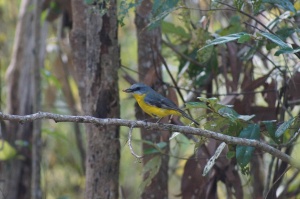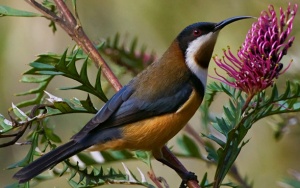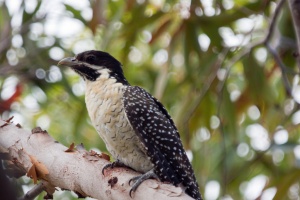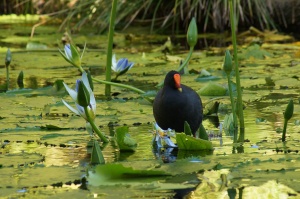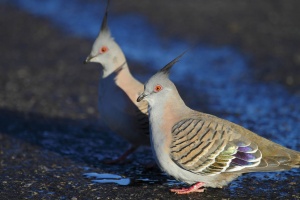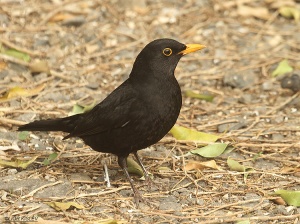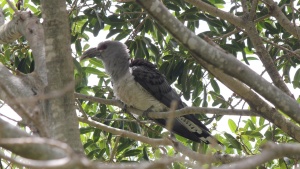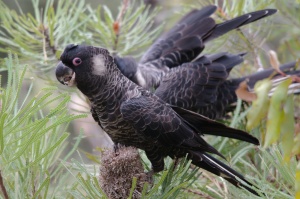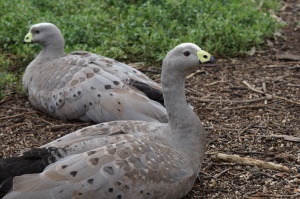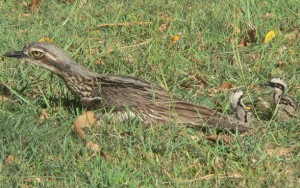Jen Sutfin
Eastern Yellow Robin
It has a grey back and head, and bright-yellow underparts. Southern birds have an olive-yellow rump, while birds in northern Australia have a brighter yellow rump. Its throat is off-white and when seen in flight, it has a pale bar on its wings. Its bill is black. Young birds are rufous-brown with paler streaks.
Size
13 – 17 cm long, the males are slightly larger
Eastern Spinebill
The top of the adult male's head is grey-black, extending in a line down either side of its white breast. Its throat is also white, with a rufous patch in the centre. Its wings and lower back are dark metallic grey and its upper back and underneath are buff. In flight, its white outer tail feathers are visible. The female has similar but duller colouring. A young bird has less distinct markings with dark olive on top of its head, a white chin and throat and a cinnamon chest and belly.
Distinctive feature
It has a very long, fine beak that curves downward.
Eastern Koel
The adult male is a distinctive glossy black tinged with iridescent blue and green all over, including its long tail, and it has a striking red eye. The female is glossy brown with white spots on top, and buff-cream underneath with many fine black bars running across its belly. The top of its head is black or brown with pale streaks, and its tail is brown with white bars running across it. A young bird looks like an adult female but has buff barring on its wings and generally much more buff colouring.
Dusky Moorhen
A dark grey to black bird with a yellow-tipped red bill, red frontal shield, red legs, and white undertails. Hatchlings are also black with red frontal shield, juveniles have green legs, green horn or black coloured bill, generally paler.
Size
35-40 cm (from head to tail)
Crested Pigeon
Black and white, with the pattern varying across its range. The back of its neck, upper tail and shoulders (on its wings) are white in males and grey in females, and (across most of Australia) the rest of its body is black. In south-eastern, central and south-western Australia, including Tasmania, its back and rump are entirely white. Its eye is red-brown. Young birds are usually grey rather than black and have dark eyes.
Distinctive feature
One toe faces backwards and three face forwards. It has a square-tipped tail.
Common Blackbird
The adult male is black with a deep-orange to yellow beak, a narrow orange to yellow ring around its eye, and dark legs. The female is grey-brown, with some streaks or mottling, and its back is darker than its belly. The female also has a paler chin than the male, a dull yellow-brown beak, dark legs, and the ring around her eye is less bright. Young birds are also brown but with lighter underparts and a dark grey or black beak.
Size
25 to 28 cm (from head to tail)
Channel-billed Cuckoo
The Channel-billed Cuckoo is grey all over, with dark scalloping on its back and wing-coverts, a whitish belly and abdomen, and fine dark barring on the lower underbody. Its long tail is pale-grey on top with two central feathers tipped with white, with a black band near the tip; the undertail has black-and-white barring. In flight, its tail and wings give it a cross-shaped silhouette. Its eyes are bright red and there is a bare patch of red skin around the eye and near the base of the bill. Its legs and feet are dark grey.
Young birds are mottled buff, brown and grey, have an olive to brown eye and lack the red-colouring around its eye.
Distinctive feature
Its large, downward-curved beak which is greyish with a paler tip.
Carnaby’s Black-Cockatoo
Dull black cockatoo with pale feather margins; white patch on ear coverts and white panels in long tail, often exposed in flight. The male has a black bill, reddish eye-ring, dull white ear patch, and lesdistinct feather margins. The female has a whitish bill, grey eye-ring, clear-white ear patch, and broader pale margins to breast-feathers.
Nest
Decayed wood debris in large hollow in eucalypt, from near ground to over 20 m.
Cape Barren Goose
Large, pale ash-grey goose with a square black tail. Its triangular bill is almost completely covered by a greenish-yellow cere (skin above the bill). Rows of large dark spots in lines across its shoulders and wing coverts. Legs are pink with black feet. In flight it shows dark wingtips.
Size
Between 75-100 cm. Males are larger than females weighing between 3.5-5.5 kg while females weigh on average 3.5 kg. Their wingspan measures between 150-190 cm.
Bush Stone-curlew
The Bush Stone-curlew has large yellow eyes and long thin legs. Its colouring is mostly grey-brown above, with bold black and rufous streaks. It has buff and white underparts with black streaks. Young birds are similar in colour, but are generally paler.
Distinctive feature
A prominent white eyebrow
Size
54 – 59 cm; wingspan is 82 – 105 cm

